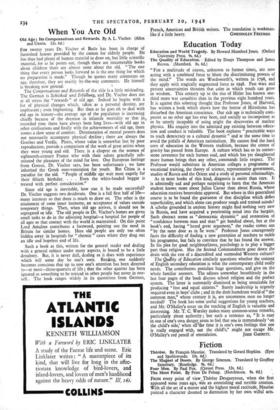Education Today
" Fox a multitude of causes, unknown to former times, are now acting with a combined force to blunt the discriminatng powers of the mind." The words are Wordsworth's, written in 1798, and they apply with tragically augmented force to 1948. Past wars and present uncertainties threaten that calm in which youth can grow in wisdom. This century up to the rise of Hitler has known one- third more war casualties than in the previous eight hundred years. It is against this sobering thought that Professor Jones, of Harvard, has written a book which shows how the horror of Hiroshima has disturbed the American conscience. Our sick age is technically com- petent as no other age has ever been, and socially so incompetent as to be utterly incapable of using aright the discoveries of nuclear physics. His enquiry into the admitted gap existing between educa- tion and conduct is valuable. The book explores " practicable ways to teach democracy as a cultural dynamic " and at the same time to avoid the pitfalls of American nationalism. He cannot find the hard core of education in the Western tradition, because the centre of gravity has passed from Europe. A culture which has as its corner- stone reverence for each human soul, and which has yet slaughtered more human beings than any other, commands little respect. The Professor would substitute in American colleges a programme of vocational training, the theory of science, representative government, studies of Russia and the Orient and a study of personal relationships.
As in most books of this kind, diagnosis is easier than cure. It is admittedly sad and perhaps surprising to learn that the Amercan student knows more about Julius Caesar than about Russia, whose education receives benevolent approval. But where in this generalised course is to be found the guarantee of that discipline which defies superficiality, and which alone can produce tough and trained minds? A scholar grounded in ancient history might find nothing very new in Russia, and have acquired a penetrating mind into the bargain. Such abstract terms as "democratic dynamic" and restoration of "confidence between man and man" get bandied about, but at the book's end, having " heard great argument," the reader comes out " by the same door as in fie went." Professor Jones courageously faces the difficulty of finding a new generation of teachers to tackle his programme, but fails to convince that he has found the answer. In his plea for good neighbourliness, psychology is to play a bigger part than religion. Has the Second Commandment gone down the drain with the rest of a discredited and outmoded Western culture?
The Quality of Education similarly questions whether the content of English secondary education is what the contemporary child really needs. The contributors postulate huge questions, and give on the whole familiar answers. The editors somewhat breathlessly in the last four pages of the book discuss school religion and the prefect system. The latter is summarily dismissed as being unsuitable for producing " free and equal citizens." Surely leadership is urgently required even in boys' clubs ; and in the drab humdrum world of " the common man," whose century it is, are uncommon men no longer needed? The book has some useful suggestions for young teachers, and Mr. O'Malley's essay on the teaching of English is valuable and interesting. Mr. T. C. Worsley makes many common-sense remarks, particularly about authority ; but such a sentence as, " It is easy in one of one's own danger,areas to feel that one is tremendously ' on the child's side,' when all the time it is one's own feelings that one is really engaged with, not the child's," might not escape Mr.
O'Malley's red pencil of emendation. JOHN GARRETT.






























 Previous page
Previous page